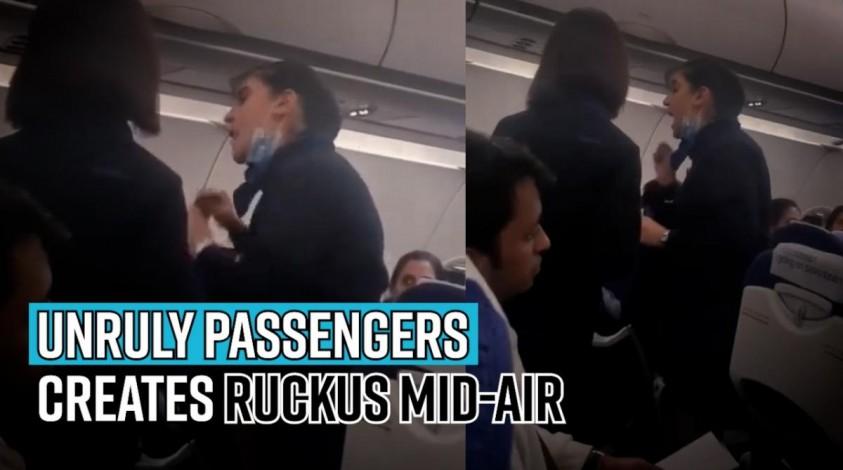“Servants Of The Passenger”; Are Indians By Large Unrespectful Towards “Dignity Of Labour”; Do We Need Stricter Laws & Punishment For Unruly Air Passengers In India?
One aggressive passenger can jeopardize the safety onboard, and one unruly passenger affects all in the process connected to the flight operation.

In December, a massive debate on social media erupted over a video of a verbal altercation between an IndiGo flight attendant and a passenger flying from Istanbul to Delhi. The viral video showed a passenger calling one of the onboard crew members “servants of the passenger”.
Atithi Devo Bhava is what we Indians call guests; its literal meaning is that A guest is akin to God.
The term embodies the traditional Indian Hindu – Buddhist philosophy of revering guests with the same respect as a god, and it goes even beyond the traditional Hindu-Buddhist common greeting of namaste (I bow to the divinity in you) used for everyone.
But what happens when the guest, in turn, starts to abuse the sentiment and calls the host a “servant”?

This is the question that comes to mind when social media was abuzz with the incident of a passenger who became so disrespectful that he labelled the flight crew as “servants of the passenger”!
From the available insights, the same passenger had allegedly been harassing the crew throughout the flight before a courageous flight attendant woman interjected.
In the video, she is seen telling the passenger that her crew was crying because of him and that they were employees and not servants.
Kudos to this brave flight attendant who not only stood up for her profession but also for her colleagues and herself!
However, the fact is that this is not an isolated incident.
It is common knowledge that flight attendants have a tough time on board flights – they are subjected to ogling, rude behaviour, made fun of, and in some cases, even physical assault, slapped and abused on board flights, called servants, or worse.
But why is it so? Is it because of an underlying fact that we, as Indians, don’t respect the “dignity of labour”?
Look around; how do we treat people who make less money than we may be making? Or those who do menial jobs, think one gets the drift!
The truth is we, as Indians, seem to respect those who are in some capacity in a seat of authority – whether that comes via position, power, money or influence!
How does the majority of the population treat people employed with us – the maids, the car washer and, in general, each other as humans?
Not great is what comes to mind!
Now coming to the topic at hand, off late, there have been many cases that have come out in the media of air travellers that have done questionable acts (Air India’s pee-gate), and now this, but yet they are many that do not come out in the media.

Hence the question: Does India Need Stricter Laws and Punishment For Unruly Air Travellers?
The fact is that India does have a policy for unruly air passengers.
According to this, if any passenger in an aeroplane or the airport is displaying unruly behaviour or is not abiding by the required conduct as prescribed, that passenger can be punishable as per the law.
Coming back to this incident, it all apparently started over food!
The passenger had booked a sandwich on board the flight food catering and, when given, refused to eat the same, citing it was cold and also that she should have hurried the service.
But the problem and how the incident degraded to mayhem was over the fact that the flight attendant was not being given a chance to explain as she was being cut and rudely interrupted at each instance.
The junior flight attendant was behaved with so rudely that she became teary-eyed and went away.
After this, the senior flight attendant appeared to calm the customer down, but the entire episode resulted in a screaming match and a refusal on the part of the passenger to understand and thus resulted in him calling the aircraft crew as “servants of the passenger”.

This atypical behaviour is displayed by many air travellers who take it upon themselves to behave in a high and mighty manner, a royalty aboard a flight, and to be treated such!
In this instance, social media was divided, as is often the case.
While one side argued that the passenger was right since he was the customer and the customer is king. In contrast, the other side maintained that no one has the right to treat or behave in such a manner and to proclaim that a company employee equates to a passenger’s servant.
This is where one needs to take a pause and understand what exactly is the point of concern here.
The DGCA Stand On This Issue
A senior official at the Directorate General of Civil Aviation (DGCA) said the regulator is looking into the incident and shall take appropriate action.
However, following this incident, the DGCA also revealed that thousands of such complaints are reported to them yearly. Through this statement alone, one can gauge the ill-treatment and misbehaviour the crew has to deal with.
If this is typical behaviour on board flights, working in the aviation sector must be a nightmare!
Following the incident, the DGCA also said that taking cognizance of the fact the civil aviation rules have been amended and updates have been made under which if a passenger harbours any unruly behaviour, then under the law, it is a punishable offence, the passenger can be declared as an unruly passenger.

Are All Laws Only For The Benefit Of Crew Members?
No, suppose the air passenger has any complaint regarding the crew. In that case, they can file a complaint on the AirSewa portal or directly file a complaint with the DGCA, the regulator for air aviation.
The DGCA also takes so moto cognizance of complaints filed on social media platforms.
And hence taking into account both the fronts – passenger and crew- these rules have been made such that any unruly behaviour inside the aircraft by either – will be punished for their actions.
Why Is Unruly Passenger Dangerous?
An unruly passenger can be a huge safety risk and, needless to say, also affects the morale of the crew members and fellow travellers.
Hence, keeping the above in mind, the Civil Aviation Requirement has updated the aircraft rules 1937 and added Rules 22, 23 and 29 with the permission of the Civil Aviation Ministry.
The above has been done so they can define an unruly passenger, their behaviour pattern, and how to classify an unruly passenger.
Rule 22 deals with assault and other acts of interference against crew members.
It says that no persons on board shall assault, intimidate or threaten, whether physically or verbally, a crew member which may interfere with the performance of the crew member’s duties or lessens the ability of the crew member to perform those duties.
The passenger shall also be made aware that in case his behaviour falls into one of the following categories, he/she is likely to be breaking the law and could be arrested on arrival at the destination or at any other airport where the aircraft commander may choose to land.
Categories of Unruly Passenger
-Consuming alcoholic beverages or drugs resulting in significant intoxication and unruly behaviour.
-Smoking on an aircraft
-Failure to obey the instructions of the pilot in command.
-Acting in a disruptive manner by
- Use of any threatening, abusive or insulting words towards a member of the crew or passengers.
- Physically behaving in a threatening, abusive, insulting or disorderly manner towards a member of the crew or passengers.
- Intentionally interfering with the performance of a crew member.
- Endangering the safety of an aircraft and persons therein.
Unruly Passenger classification
Level 1 – Disruptive behaviour
Level 2 – Physically abusive behaviour
Level 3 – Life-threatening behaviour
Conclusion: Currently, in India, we have appended laws that apply to crew members and unruly passengers.




